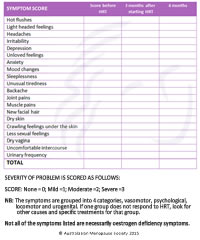Menopause Basics
The following topics concerning the menopause basics may be found in the AMS Information Sheets.
What is Menopause?
The menopause is sometimes called 'the change of life' as it marks the end of a woman's reproductive life. At menopause, eggs are no longer produced by the ovary and production of oestrogen and progesterone ceases. The word "menopause" refers to the last or final menstrual period a woman experiences.
When a woman has had no periods for 12 consecutive months she is considered to be “postmenopausal”. Most women become menopausal naturally between the ages of 45 and 55 years, with the average age of onset at around 50 years. “Premature menopause” may occur before the age of 40 due to either natural ovarian function ceasing, following surgery to remove the ovaries, or as a result of cancer treatments. Menopause is considered “early” when it occurs between 40 and 45 years. (For more, see the information sheets “Spontaneous Premature Ovarian Insufficiency” and “Early menopause due to chemotherapy”).
![]() AMS What is menopause?555.18 KB
AMS What is menopause?555.18 KB
![]() Menopause - What are the Symptoms?
Menopause - What are the Symptoms?
Diagnosing Menopause
 Frequently, the diagnosis of menopause has already been made by the woman herself. She attends her GP with symptoms such as hot flushes or night sweats interrupting her sleep, together with changes in her menstrual cycle. Not all women with menopausal symptoms will need treatment. Most women will be glad of information about menopause and about the safe and effective treatment options available. The questions we should be asking her are "Why did you come to see me", and "What do you hope to get out of this consultation?"
Frequently, the diagnosis of menopause has already been made by the woman herself. She attends her GP with symptoms such as hot flushes or night sweats interrupting her sleep, together with changes in her menstrual cycle. Not all women with menopausal symptoms will need treatment. Most women will be glad of information about menopause and about the safe and effective treatment options available. The questions we should be asking her are "Why did you come to see me", and "What do you hope to get out of this consultation?"
![]() AMS Diagnosing menopause398.75 KB
AMS Diagnosing menopause398.75 KB
![]() AMS Diagnosing Menopause Symptom score card118.51 KB
AMS Diagnosing Menopause Symptom score card118.51 KB
Weight management and healthy ageing
For women at midlife, it can be difficult to separate the effects of ageing from the effects of menopause. Ageing is associated with weight gain in both women and men. Weight gain during and after menopause is associated both with lifestyle factors and the physiological changes of ageing, as well as with the hormonal changes of menopause.
![]() AMS Weight management and healthy ageing232.63 KB
AMS Weight management and healthy ageing232.63 KB
![]() Menopause - How will it affect my health?
Menopause - How will it affect my health?
Glossary of Terms
A description of words and terms used in menopause and women's health.
![]() AMS Glossary of Terms655.37 KB
AMS Glossary of Terms655.37 KB

Note: Medical and scientific information provided and endorsed by the Australasian Menopause Society might not be relevant to a particular person's circumstances and should always be discussed with that person's own healthcare provider.
These Information Sheets may contain copyright or otherwise protected material. Reproduction of this Information Sheet by Australasian Menopause Society Members and other health professionals for clinical practice is permissible. Any other use of this information (hardcopy and electronic versions) must be agreed to and approved by the Australasian Menopause Society.
Content updated April 2023
